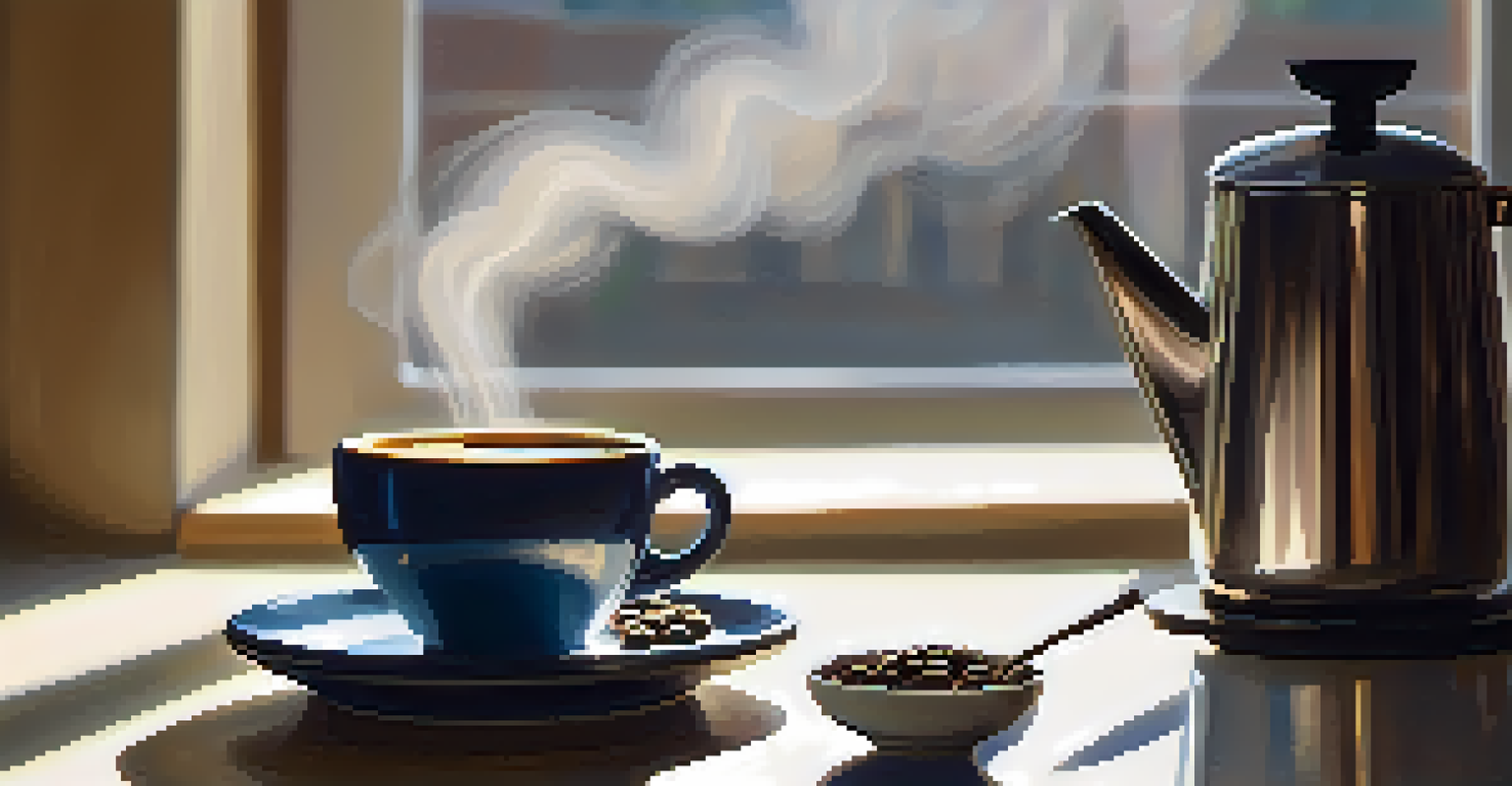The Effects of Caffeine on Mental Health and Anxiety

Caffeine: A Brief Overview of Its Role in Daily Life
Caffeine is a natural stimulant found in coffee, tea, and various energy drinks. It's often consumed for its ability to improve alertness and combat fatigue. Many people rely on caffeine to kickstart their day or power through the afternoon slump, but its effects are more complex than just a quick energy boost.
Too much caffeine can cause anxiety, but in moderation, it can improve mental performance.
While caffeine can enhance focus and elevate mood, it's important to understand that it can also have downsides, especially regarding mental health. For some individuals, excessive caffeine consumption can lead to increased anxiety and restlessness. The key lies in moderation and understanding how your body reacts to this stimulant.
In essence, caffeine plays a dual role: it can be both a friend and a foe. Knowing how it interacts with your mental state can help you make informed choices about your consumption habits.
The Science Behind Caffeine and Its Effects on the Brain
Caffeine works primarily by blocking adenosine, a neurotransmitter that promotes sleep and relaxation. When adenosine is blocked, the brain's activity increases, leading to a feeling of wakefulness. This process is what makes caffeine effective for boosting energy and alertness.

However, this stimulation can also lead to heightened anxiety levels. When the brain is overly stimulated, it can trigger the body's fight-or-flight response, which is responsible for feelings of anxiety. This is particularly evident in individuals who are already prone to anxiety disorders.
Caffeine's Dual Role in Mental Health
Caffeine can enhance alertness and mood for some, but it may exacerbate anxiety in others.
Understanding this mechanism is crucial. It highlights why some people may experience jitteriness and heightened stress with just a cup or two of coffee, while others may enjoy the benefits without the drawbacks.
Caffeine Consumption and Its Link to Anxiety Disorders
Research suggests a significant link between caffeine consumption and anxiety disorders. Studies have shown that individuals with generalized anxiety disorder (GAD) may experience exacerbated symptoms when they consume caffeine. This correlation is especially concerning for those already struggling with anxiety.
Caffeine is like a double-edged sword; it can lift you up or bring you down.
For many, the mild anxiety that can come from caffeine consumption feels like a normal side effect. However, for those with existing anxiety issues, even a small amount of caffeine can feel overwhelming and lead to panic attacks or increased worry.
Thus, it's essential for individuals with anxiety disorders to monitor their caffeine intake. Reducing consumption or switching to decaffeinated options might offer relief from anxiety symptoms.
Positive Effects of Caffeine on Mental Health
Despite its potential drawbacks, caffeine can have positive effects on mental health for many individuals. Moderate caffeine intake has been associated with improved mood and cognitive function, making it a popular choice for those looking to enhance their productivity.
Moreover, caffeine has been linked to a lower risk of depression in some studies. This might be due to its ability to increase dopamine production, the neurotransmitter responsible for feelings of pleasure and reward.
Personal Tolerance Varies Widely
Individual reactions to caffeine differ greatly, influenced by genetics and health, making personal tolerance important.
Therefore, it’s important to recognize that while caffeine can contribute to anxiety for some, it can also boost mental well-being for others. Finding the right balance is key.
Identifying Your Personal Caffeine Tolerance
Everyone’s body reacts differently to caffeine, and understanding your personal tolerance is essential. Some may thrive on multiple cups of coffee, while others might feel anxious after just one. Factors like genetics, lifestyle, and overall health can influence how caffeine affects you.
To identify your tolerance, consider keeping a journal of your caffeine intake and any associated feelings or symptoms. This can help you pinpoint how much caffeine is beneficial versus how much could lead to anxiety.
Remember, it’s not just about the quantity; the timing of your caffeine consumption can also play a role. Consuming caffeine too close to bedtime can disrupt sleep and contribute to anxiety the next day.
Strategies for Managing Caffeine Intake
If you find that caffeine is contributing to your anxiety, there are several strategies you can employ. Gradually reducing your intake can help your body adjust without severe withdrawal symptoms. Start by cutting back on one cup a day or switching to lower-caffeine beverages like tea.
Additionally, consider replacing your caffeine fix with alternatives that provide a boost without the jitters. Herbal teas or adaptogenic drinks can offer calming effects while keeping you alert.
Managing Caffeine Intake is Key
Strategies like reducing intake and choosing lower-caffeine alternatives can help manage anxiety linked to caffeine.
Lastly, always listen to your body. If you notice increased anxiety or restlessness, it may be time to reassess your caffeine habits and make necessary adjustments.
Conclusion: Finding Balance with Caffeine
In conclusion, caffeine can significantly impact mental health and anxiety levels, both positively and negatively. Understanding your own body’s response to caffeine is crucial for making informed choices about your consumption. It’s all about finding that sweet spot where you can enjoy the benefits without the drawbacks.
As you navigate your caffeine journey, remember that moderation is key. Experimenting with different amounts and types of caffeine can help you discover what works best for you.

Ultimately, being mindful of your caffeine intake can lead to better mental health and reduced anxiety. It's about creating a lifestyle that supports your well-being while still enjoying your favorite caffeinated beverages.